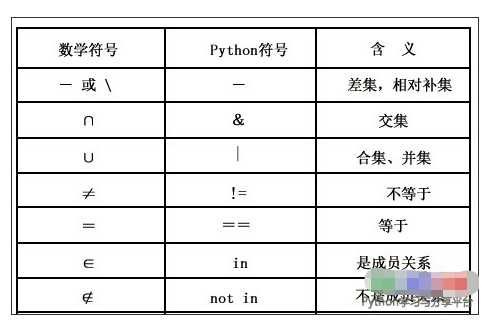python 数据结构
Posted lgx-fighting
tags:
篇首语:本文由小常识网(cha138.com)小编为大家整理,主要介绍了python 数据结构相关的知识,希望对你有一定的参考价值。
一.Python 集合set()添加删除、交集、并集、集合操作详解
在Python set是基本数据类型的一种集合类型,它有可变集合(set())和不可变集合(frozenset)两种。创建集合set、集合set添加、集合删除、交集、并集、差集的操作都是非常实用的方法。
1.python set类是在python的sets模块中,大家现在使用的python2.7.x中,不需要导入sets模块可以直接创建集合。
>>>set(‘boy‘)
set([‘y‘, ‘b‘, ‘o‘])
set()的值不能重复
2.集合添加、删除
python 集合的添加有两种常用方法,分别是add和update。
集合add方法:是把要传入的元素做为一个整个添加到集合中,例如:
>>> a = set(‘boy‘)
>>> a.add(‘python‘)
>>> a
set([‘y‘, ‘python‘, ‘b‘, ‘o‘])
3.集合update方法:是把要传入的元素拆分,做为个体传入到集合中,例如:
>>> a = set(‘boy‘)
>>> a.update(‘python‘)
>>> a
set([‘b‘, ‘h‘, ‘o‘, ‘n‘, ‘p‘, ‘t‘, ‘y‘])
4.集合删除操作方法:remove
set([‘y‘, ‘python‘, ‘b‘, ‘o‘])
>>> a.remove(‘python‘)
>>> a
set([‘y‘, ‘b‘, ‘o‘])
5.python set() 集合操作符号、数学符号
集合的交集、合集(并集)、差集,了解python集合set与列表list的这些非常好用的功能前,要先了解一些集合操作符号

可变集合python set是www.iplaypy.com玩蛇网python学习交流平台,初期python学习中比较能接触到的。像列表、字典、字符串这类可迭代的对像都可以做为集合的参数。set集合是无序的,不能通过索引和切片来做一些操作。
python中set集合如何决定是否重复?
看下面代码,两个值相同的Item对象,添加到set中被认为是两个对象。
- class Item(object):
- def __init__(self, foo, bar):
- self.foo = foo
- self.bar = bar
- def __repr__(self):
- return "Item(%s, %s)" % (self.foo, self.bar)
- print set([Item(‘1‘, ‘2‘), Item(‘1‘, ‘2‘)])
- # 输出: set([Item(1, 2), Item(1, 2)])
数据结构中HASH表的设计思路是:
- 被插入元素根据hash值决定插入那个桶(通常一个数组)中
- 新插入元素根据的equals方法依次比较桶内元素,以确定是否已经存在
在python中如果我们自定义class,则需要添加__hash__和__eq__两个方法,前者用于决定当前元素在哪个桶,后者决定当前元素是否在桶中已经存在。
修改后的code如下:
- class Item(object):
- def __init__(self, foo, bar):
- self.foo = foo
- self.bar = bar
- def __repr__(self):
- return "Item(%s, %s)" % (self.foo, self.bar)
- def __eq__(self, other):
- if isinstance(other, Item):
- return ((self.foo == other.foo) and (self.bar == other.bar))
- else:
- return False
- def __hash__(self):
- return hash(self.foo + " " + self.bar)
- print set([Item(‘1‘, ‘2‘), Item(‘1‘, ‘2‘)])
- # 输出:set([Item(1, 2)])
以上是关于python 数据结构的主要内容,如果未能解决你的问题,请参考以下文章